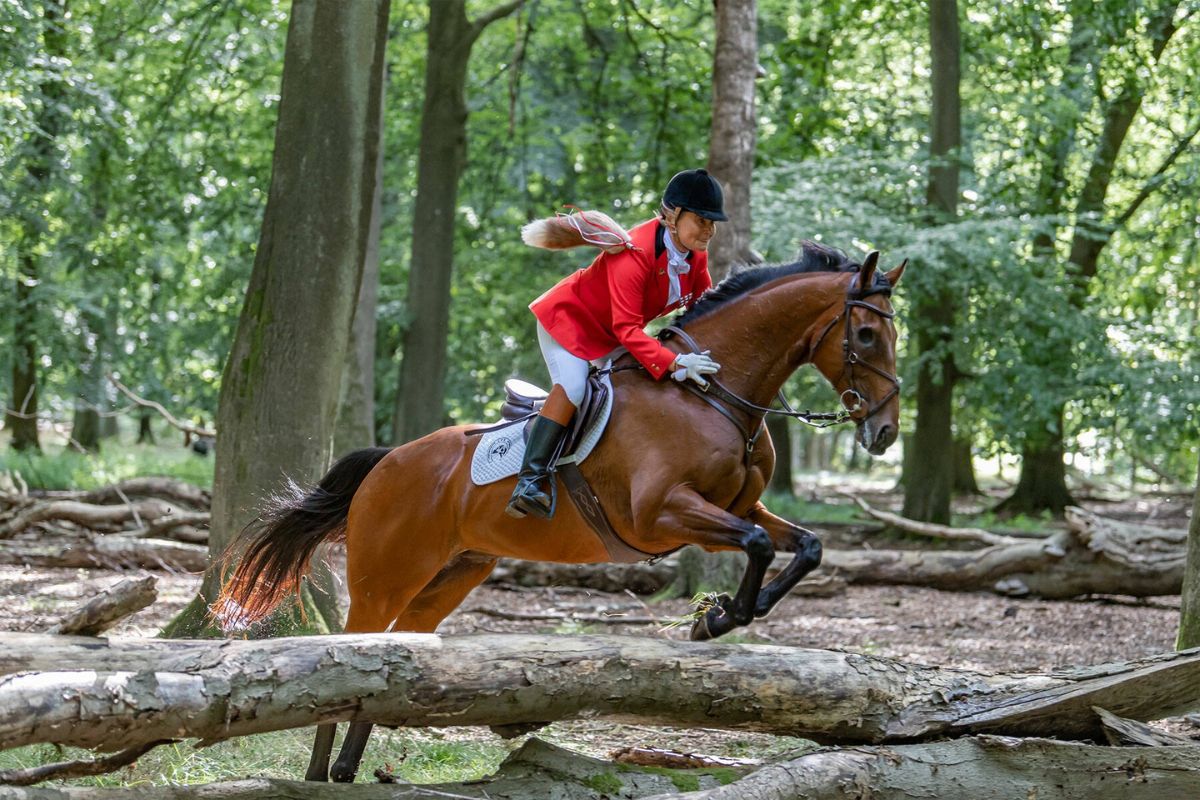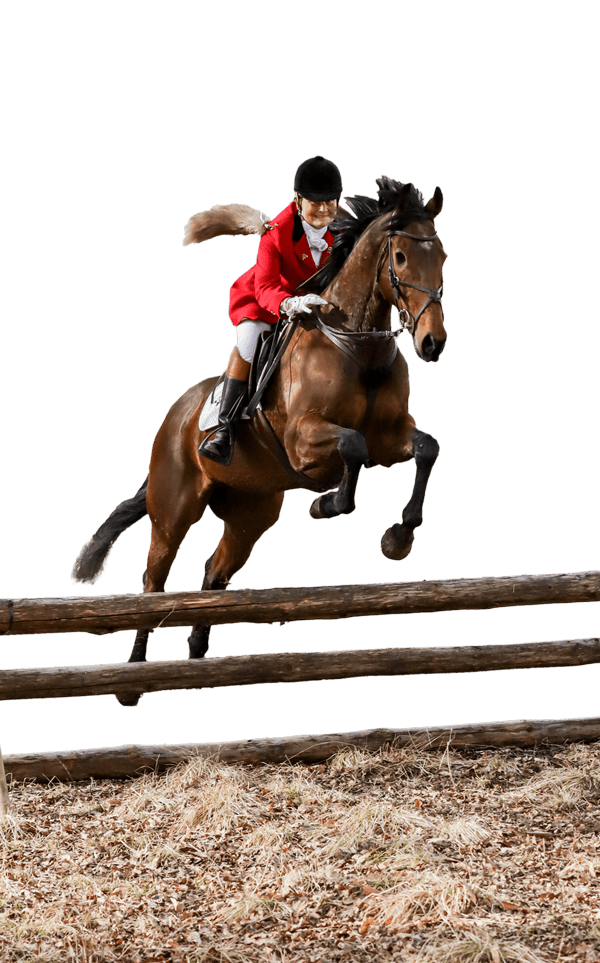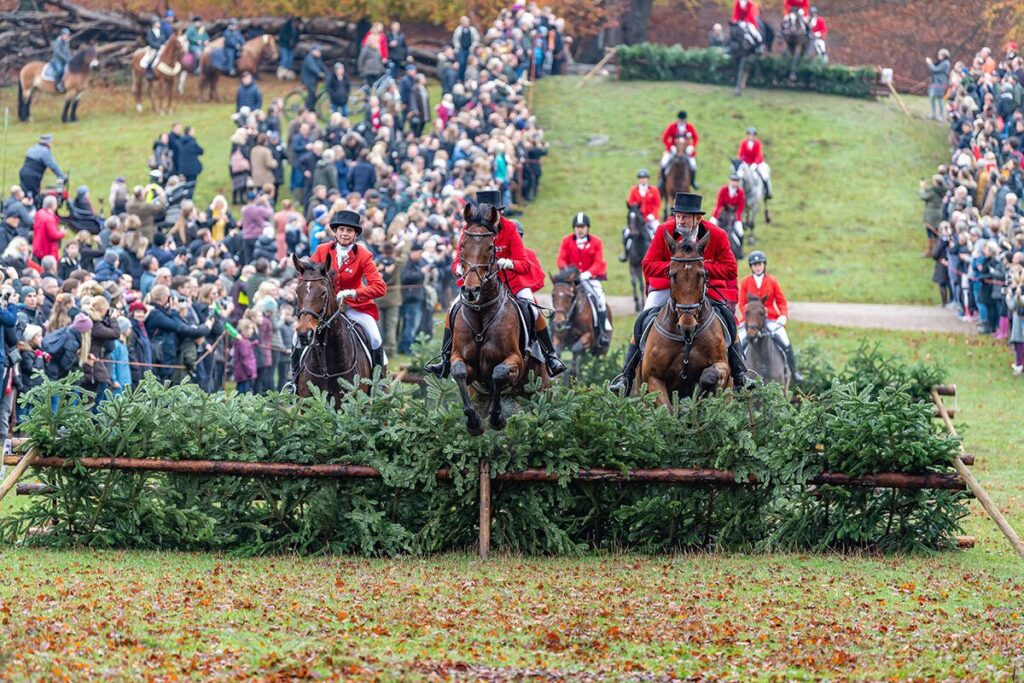Menu

The deep hollowing on the side of the head testifies that something is missing. Something that once had an important place in the horse's body. A body part which is really hard to imagine that it can live without. How can it place itself in the world around it? Can it be ridden when he loses an eye?
When a horse loses an eye, its life is not necessarily over. Hunter Mette Kaufmann can attest to that. Read the inspiring story of her and her 17-year-old, Irish thoroughbred horse, Churchtowns Star – among friends called Langben (Longlegs). In the spring of 2020, he lost his right eye. Today, the hunting crew ride undisturbed at full speed across the meadows, forest and the fixed obstacles.
You may also like to read: Falling off without getting seriously injured
All started when Langben back in 2018 started getting small blisters on the cornea of his right eye. It was liquid, and it was clear to Mette that her horse was in pain. Therefore, she naturally had him examined and treated in the best possible way. In 2019, the vet was able to conclude that it was a relatively normal but quite serious eye disease.

The diagnosis was based on immune-mediated keratitis (IMMK). It is an immune system disease in which the eye attacks itself. Often, the disease can be treated before the blisters burst, but they will probably return. Therefore, it can be an enormously protracted and worrying disease that is difficult to predict the outcome from. That was what Mette and Langben experienced before she had to make a drastic decision in 2019.
The first thing Mette went on to try to save Langben's eye was an operation on the cornea. “I would rather not have had his eye removed, so the vet found an ophthalmologist for animals who works in Sweden and was trained in the United States. She did a microsurgical operation on his eye".
Not surprisingly, the operation was both expensive and demanding, and long-term medication was required afterwards. Mette says that Langben is definitely not good at sleeping in foreign surroundings, and therefore she was allowed to take him home a few days after the operation. But the price for this was high.
"I had to medicate him every four hours around the clock for three weeks" she says. The sentence is followed by an emotional pause that clearly testifies to how hard it was and how much she would do to help her partner.
With a warm-hearted sigh, she continues: “So I did. I slept as if I had had a baby again and had the alarm clock ringing at night so I could drive over to the barn and give him his medicine. But the worst thing about it all was, that 14 days after the surgery, it came back. This time in a different place in the same eye.”

To some, it might seem both sad and a little creepy when a horse is missing an eye. Mette thought so too when she was confronted with the possibility. In fact, she was terrified at the thought of her horse becoming one-eyed. She continued struggling with Langben's eye disease on the back burner of the unsuccessful operation. Then, in January 2020, she and her veterinarian decided that the eye had to be removed.
“I said, this has to stop. I felt so bad for him. I talked to several people who had showjumpers who had also lost an eye. They all said that the horses were fine and that it was no problem for them to keep jumping,” she explains.
However, the fact that one rider had experienced that the horse had problems assessing level differences in the terrain made her worried. “I just thought, oh no, all I do is ride terrain on mine. Even though she was not excited about it, there was nothing else to be done...
Therefore, Langben had his eye removed.
Surprisingly, Mette was able to quickly evoke many of her worries to the ground. Langben was well after the operation, and it did not take long before Mette was back in the saddle again. In fact, it only took a couple of weeks.

“It's a little bit funny. The expensive eye surgery that did not work required three months in which he was not allowed to do much. But when he had his eye removed, I was able to ride shortly after. 16 days after the stitches were taken, I was allowed to sit on him. And after another, we rode in the terrain and took a few small jumps".
However, it is no secret that she was quite frightened of jumping in the terrain on her now half-blind horse. She hardly dared, she says. But with a good explanation from a professional who told her that horses do not judge distance the same way as humans. This is because their eyes sit on the side of their head. After that, her trust in jumping came back.
You may also like to read: “Every step Hudini and I take together is a victory”
When Mette is asked if she could generally feel anything different about Langben when she got back in the saddle after the operation, the answer is: "Nothing. It was simply not to be felt in the saddle that Langben now had only one eye. The problem was really in me and my head,” Mette emphasizes, referring to her fear of whether he could become a jumper again.
“Of course, I take a little care. First of all, he's allowed to turn around when I ride if he needs to look somewhere. And when we jump two and two during the hunts, I have the horse he jumps with, on the side of him where he can see. Then he can judge exactly where they are. But the horses he knows and is comfortable with, they can walk by his blind side when we ride a normal ride in the woods,” Mette explains.
The only thing she has experienced as a challenge after the surgery is that she needs to pay more attention to how she handles him from the ground. It is important that she shows him an extra time where she is. "It's not enough to talk to him. I also just have to poke him with a finger so that he can feel that I am there now,” she points out.
In addition, he also had to learn for himself what it meant that he had lost his sight on one side when he was standing in the stable. Suddenly he could feel things he could not see, and that sometimes this frightened him.

“The first 14 days he must have had a lot of bruises on his head. Once inside his stall, he could get scared of something he could not see. If, for example, he would touch the manger on the blind side, he was so startled that he threw his head and perhaps slammed it into the wall. I felt bad for him,” she says.
In the end, however, she points out that it is quite clear how Langben is all the way back to his old self: “He is happy, he has the courage to go and he is just a great friend to ride. And then he simply has so much personality.”
Langben and Mette have known each other since he came to Denmark from Ireland about ten years ago. In 2016, they won the Hubertus Hunt (famous Danish hunt) together while still having his right eye.
“I have really learned from all this that if I have to make a similar decision another time, I will not hesitate for a moment. I would definitely have had the eye removed to begin with if I had known it would end so well. Then he could have been spared the 3 months of eyedrops after the first operation - and I would have had a smaller vet bill."
It is Mette's hope that Langben's story can inspire and help other horse owners if one day they to have to make a tough and worrying decision just like her. It is at least important to remember that a horse can easily live a good and adventurous life with a visual impairment.